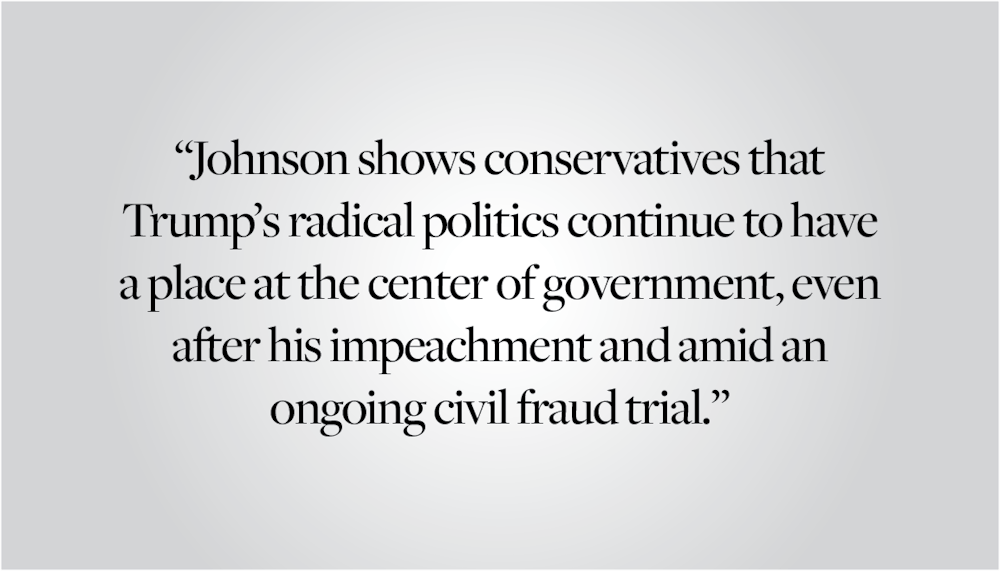The past month saw two firsts for the United States House of Representatives: first, the speaker of the House was voted out of office, and second, the speaker’s chair was taken by a Christian nationalist, Rep. Mike Johnson (R-La.). Aside from obvious concerns over a Christian nationalist holding one of the most powerful seats in government, Johnson’s election carries dangerous implications for the upcoming 2024 presidential election. It is a tell-tale sign that Donald Trump’s Christian nationalist voter base is alive and well and that Democrats cannot underestimate this bloc. Johnson’s election should remind us that preventing a second Trump term in 2024 will not be an easy task.
In case you didn’t pay attention to the fiasco that took place in the House of Representatives through October, here’s a brief recap: On Oct. 3, after eight Republicans and all Democratic representatives voted in favor of Rep. Matt Gaetz’s (R-Fla.) motion to vacate the speaker’s chair, then-Speaker Kevin McCarthy (R-Calif.) was ousted from office. 21 days and four nominees later, the Republican party filled McCarthy’s spot with Johnson. This placed Johnson into the national limelight, inviting new scrutiny on his concerning ideologies. From Johnson’s writings against same-sex marriage to his efforts to overturn the results of the 2020 presidential election, there are major reasons to doubt Johnson’s suitability for leading the House.
Johnson’s alignment with Christian nationalism — the idea that the United States is an explicitly Christian nation that must restore a close relationship with the religion — is at the foundation of his flawed politics. On his podcast, Johnson stated, "the founders wanted to protect the church from an encroaching state, not the other way around," implying Johnson’s concerning views on the "so-called separation of church and state."
Years before he was elected speaker, Johnson’s writings reflected a religious fundamentalism that is both extensive and extreme. Johnson has written ad nauseam on his refusal to separate policy from Christian beliefs. Johnson put it best himself the day after he was elected, “What does Mike Johnson think about any issue under the sun? Go pick up a Bible off your shelf and read it. That’s my worldview. That’s what I believe.” It is an understatement to say that leading with a worldview restricted to the Bible is an unfit and antiquated method for producing policy — not to mention its blatant disregard for our nation’s religious freedom.
I could discuss the extent of Johnson’s racism, homophobia and misogyny for pages — or his opposition toward gender-affirming care and his support for a six-week abortion ban. But the discussion over his abhorrent values has not given enough attention to the threat that the growing influence of Christian nationalism poses in the 2024 presidential election. Johnson’s ascension perpetuates an extremist shift in the Republican party that was in part initiated by Donald Trump. Johnson shows conservatives that Trump’s radical politics continue to have a place at the center of government, even after his impeachment and amid an ongoing civil fraud trial. Johnson’s speakership not only solidifies Trump’s continued legacy, but it sheds light on the former president’s increasingly influential base and the major potential to further mobilize his key support among white evangelicals in 2024.
In her essay, “Christian Nationalism Is One of Trump’s Most Powerful Weapons,” Katherine Stewart writes, “Christian nationalism today begins with the conviction that conservative Christians are the most oppressed group in American society.” Johnson has echoed this conviction on his podcast, stating that Americans have wrongly been told "religion has no place in the conversation." Giving Christian nationalism the bully pulpit that is the speaker’s chair allows Johnson to cement this belief and has the potential to rally Trump’s base in the same way that led to the Jan. 6 insurrection. This potential for rousing Christian nationalism and Trumpism will go far in mobilizing Republicans in the 2024 election, a daunting prospect for Democrats.
While international news has grown all-consuming in recent weeks, we can’t lose sight of the paramount task that lies ahead in national politics — mobilizing voters. Brown students have previously had poor turnout as voters, but organizations like Brown Votes have aimed to galvanize the student vote. Contributing to initiatives that get the vote out is key to aiding the success of the Democratic Party — the only current alternative to Trumpism and the radical shift in the Republican party. The election may still seem far off, but it is much closer than we realize. Starting conversations about it now — as exhausting as that is — might be crucial in bringing enough young voters to the polls on Nov. 5. Johnson’s speakership has already gotten the ball rolling for conservatives. So talk to your friends about the dreaded presidential election. Don’t let 2024 catch you by surprise.
Paul Hudes ’27 can be reached at paul_hudes@brown.edu. Please send responses to this opinion to letters@browndailyherald.com and other op-eds to opinions@browndailyherald.com.
Paul Hudes is the senior editor of opinions of The Herald's 136th Editorial Board. He previously served as an opinions editor and the head of the Editorial Page Board. He is from Baltimore, MD and studies applied mathematics and international and public affairs. Paul writes the mini crossword for The Herald four times a week.





